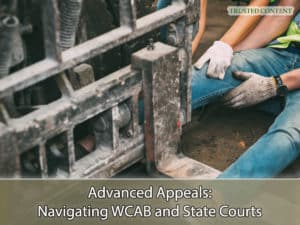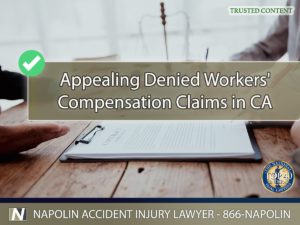A Guide to Appealing Denied Workers’ Compensation Claims in California
Workers' compensation is an essential safeguard for California employees who suffer injuries or illnesses due to their job. However, the path to obtaining these benefits can be fraught with challenges, especially when claims are unjustly denied. This comprehensive guide aims to demystify the appeal process for denied workers' compensation claims in California, providing injured workers with the knowledge they need to assert their rights.
Understanding Workers' Compensation in California
In California, workers' compensation is a no-fault system designed to provide quick and efficient benefits to workers injured on the job. This system covers medical expenses, lost wages, and rehabilitation costs. It's crucial for employees to understand that these benefits are their right, regardless of who was at fault for the injury.

Detailed Reasons for Denied Workers' Compensation Claims
Detailed Reasons for Denied Workers' Compensation Claims
Claims can be denied for various reasons. A pre-existing condition that the employer or insurance company believes is not work-related can lead to denial. Timely reporting of injuries is critical – California law requires reporting within 30 days. Missing the one-year filing deadline is another common reason for denial. Claims may also be denied due to insufficient evidence, such as lacking medical records or witness statements. Additionally, claims can be rejected if the injury occurred while the employee was intoxicated or if the injury was self-inflicted.
Step-by-Step Appeal Process for Denied Claims
The first step in appealing a denied claim is to file an Application for Adjudication of Claim with the Division of Workers' Compensation (DWC). This initiates the pre-hearing process, where you can file a Declaration of Readiness to Proceed. This stage may involve re-evaluation by a qualified medical evaluator (QME) or an agreed medical examiner (AME) to provide an objective assessment of your injuries. During the hearing, both parties aim to reach a settlement. If unresolved, the case can proceed to trial, where a judge will make a decision based on the presented evidence.

Advanced Appeals- Navigating WCAB and State Courts
Advanced Appeals: Navigating WCAB and State Courts
If the trial's outcome is unfavorable, the next step is to file a Petition for Reconsideration with the WCAB. This board reviews the trial judge's decision and can overturn it. If the WCAB's decision is still unsatisfactory, the case can be escalated to the California Court of Appeal and, if necessary, to the California Supreme Court.
The Crucial Role of an Experienced Workers' Compensation Attorney
An experienced workers' compensation attorney is invaluable in navigating the complex appeal process. They can help gather and present compelling evidence, represent you in hearings, and negotiate settlements. Their expertise can significantly increase the chances of a successful appeal.

A Guide to Appealing Denied Workers' Compensation Claims in California
A Guide to Appealing Denied Workers' Compensation Claims in California
Dealing with a denied workers' compensation claim can be overwhelming, but understanding your rights and the appeal process can empower you to fight back. At Napolin Accident Injury Lawyer, we are dedicated to supporting California's injured workers. If you need assistance with a denied workers' compensation claim, call us at (866)-NAPOLIN for a free consultation. Our extensive experience in workers' compensation litigation can help ensure that your rights are protected and you receive the benefits you deserve.
- A Guide on Red Light Auto Accidents in California - August 14, 2024
- Self-Representing in a California Personal Injury Claim - August 13, 2024
- Common Sources of Distraction for Drivers in California - August 13, 2024
